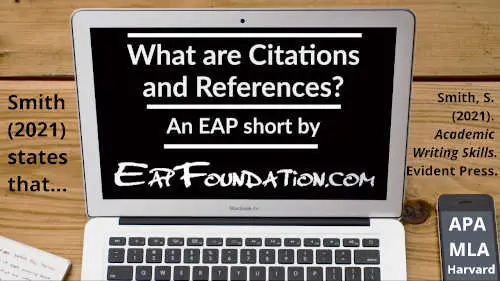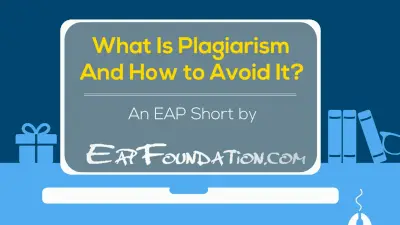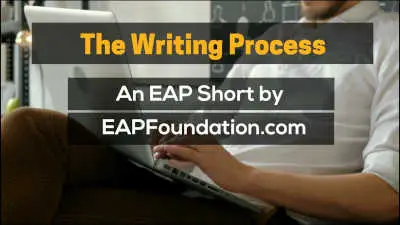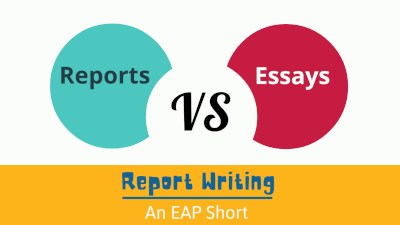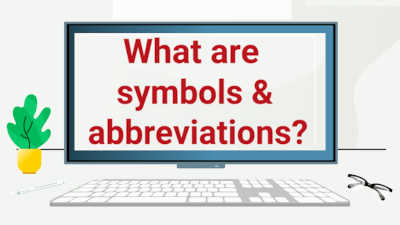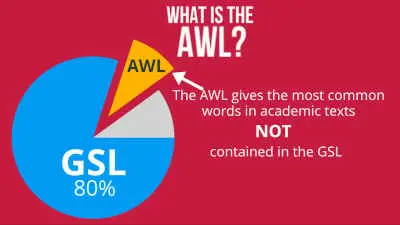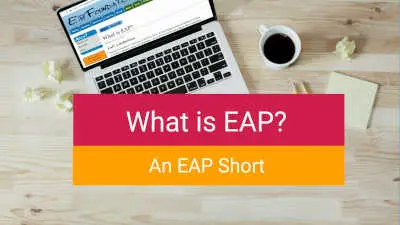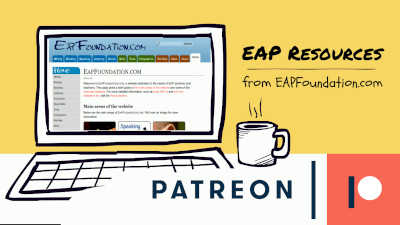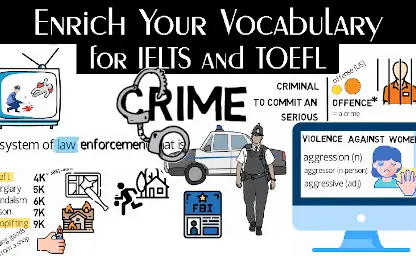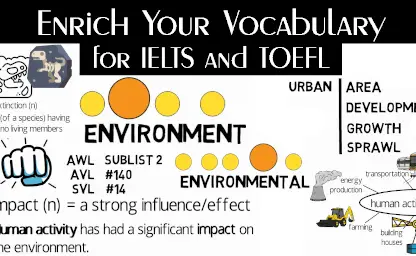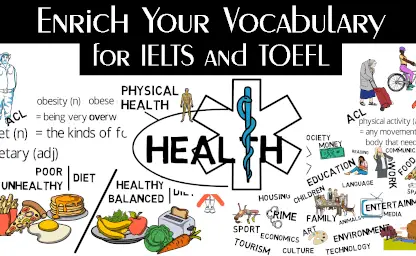Social mediaLet's keep in touch!
EAPFoundation.com has several social media pages. Below is information on some of these.
Podcasts
Many pages have podcasts, which are spoken versions of the web pages. The podcasts are embedded directly on the page. You can also catch them on PodOmatic, where the podcasts are hosted, as well as on Spotify, iTunes and Google Play.
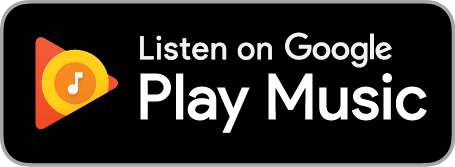
YouTube --- Youku
There are a lot of videos on the EAPFoundation.com YouTube channel (also available on Youku if YouTube is not available). There are three types: regular videos, special EAP Shorts, and the Enrich Your Vocabulary for IELTS & TOEFL series.
Regular videos
The following are regular videos, usually around 10-15 minutes long, with voice-over and detailed information on specific aspects of EAP. Many of them have worksheets (with answers) for personal or classroom use.
Features of vocabulary
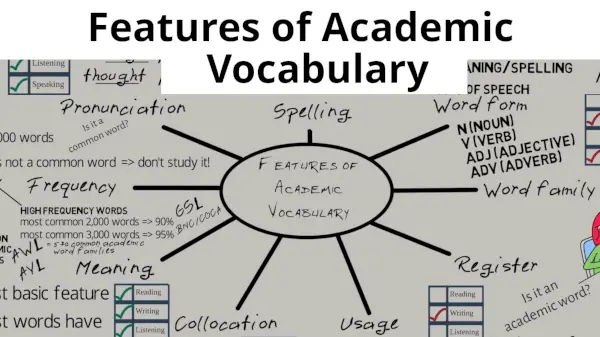
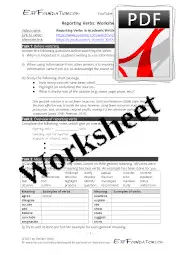 Duration: 13.06
Duration: 13.06Published: 17 Feb, 2024
View on YouTube »»
View on Youku »»
Learn more about important features of academic vocabulary such as pronunciation, word family and register. There is a worksheet (with answers and teacher's notes) for this video.
What is academic vocabulary?
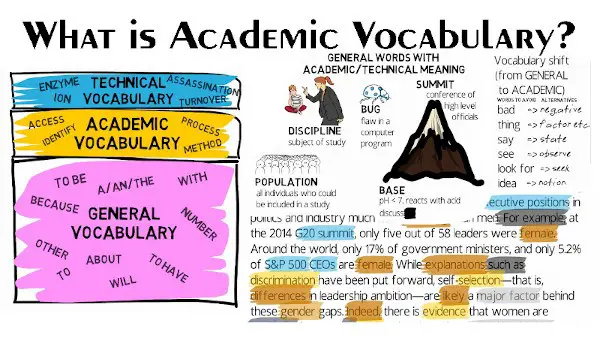
 Duration: 24.01
Duration: 24.01Published: 23 Jul, 2022
View on YouTube »»
View on Youku »»
Understand what academic vocabulary is, why studying it is important, and some tips on how to study it successfully. There is a worksheet (with answers and teacher's notes) for this video.
Writing objectively
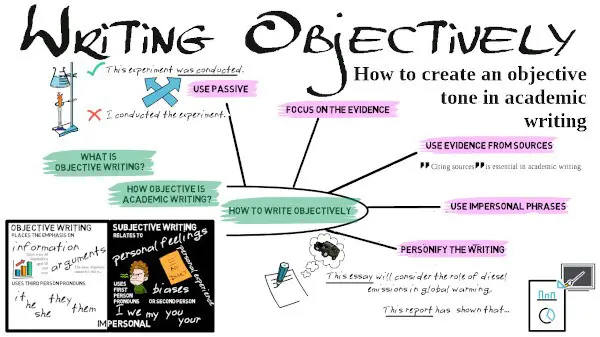
 Duration: 8.46
Duration: 8.46Published: 02 Jan, 2022
View on YouTube »»
View on Youku »»
This video looks in detail at objectivity academic writing. There is a worksheet (with answers and teacher's notes) for this video.
25 Common Collocations
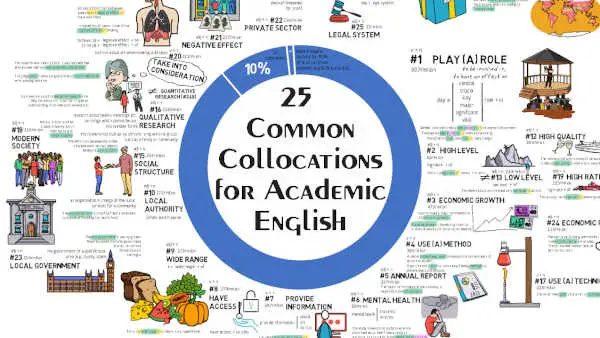
 Duration: 11.22
Duration: 11.22Published: 20 Aug, 2021
View on YouTube »»
View on Youku »»
Study the 25 most common collocations for academic English. There is a worksheet (with answers and teacher's notes) for this video.
Concordancers
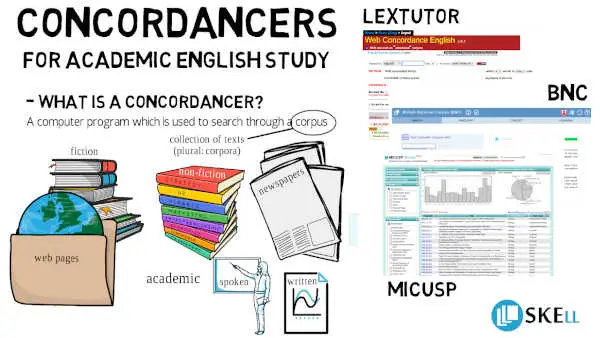
 Duration: 22.57
Duration: 22.57Published: 20 Jun, 2021
View on YouTube »»
View on Youku »»
Find out more about concordancers for academic English study. There is a worksheet (with answers and teacher's notes) for this video.
21 Academic Idioms
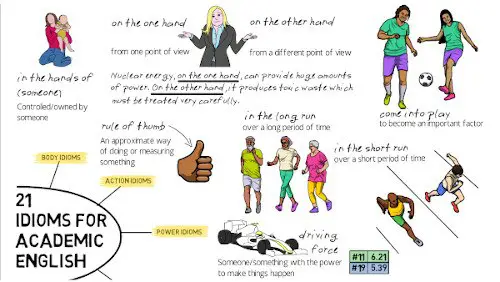
 Duration: 19.27
Duration: 19.27Published: 01 Mar, 2021
View on YouTube »»
View on Youku »»
Find out more about the 21 most common idioms for academic English. There is a worksheet (with answers and teacher's notes) for this video.
What is Academic Writing?
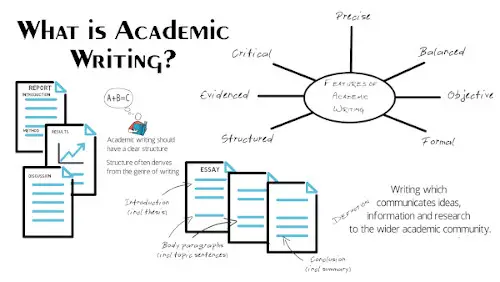
 Duration: 10.07
Duration: 10.07Published: 14 Feb, 2021
View on YouTube »»
View on Youku »»
Study what academic writing is and the main features of academic writing. There is a worksheet (with answers and teacher's notes) for this video.
Reporting Verbs
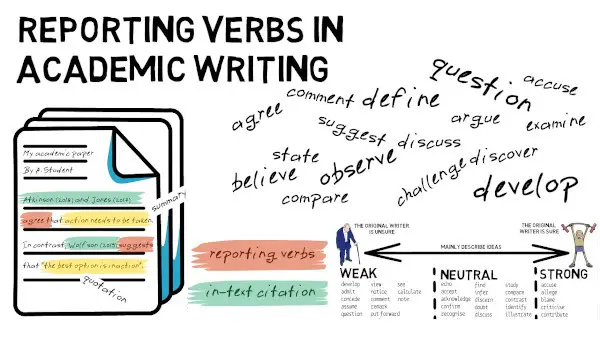
 Duration: 12.19
Duration: 12.19Published: 11 Jan, 2021
View on YouTube »»
View on Youku »»
Find out about reporting verbs in academic writing, with information on meaning, strength and grammar. There is a worksheet (with answers and teacher's notes) for this video.
Transition Signals #2
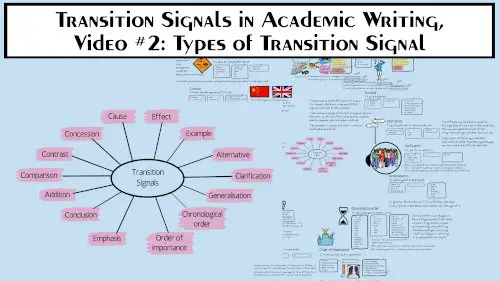
Published: 25 Dec, 2020
View on YouTube »»
View on Youku »»
Study different types of transition signal: addition, comparison, contrast, cause, effect, example, and more.
Transition Signals #1
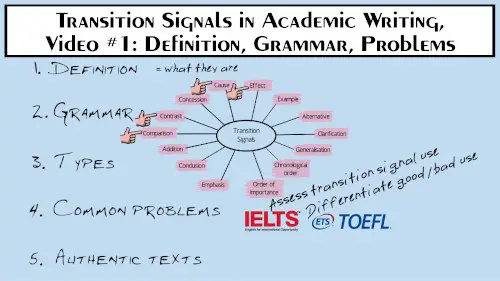
Published: 25 Dec, 2020
View on YouTube »»
View on Youku »»
Learn about what transition signals are, grammar of transition signals, and some common problems students have.
Cause and Effect essays
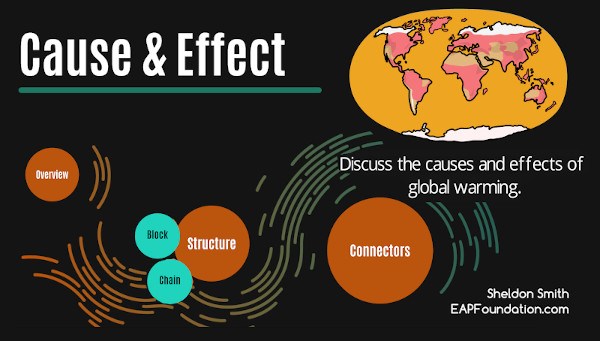
Published: 09 Nov, 2020
View on YouTube »»
View on Youku »»
Understand how to write a cause and effect essay, with global warming as an example.
Searching for Information
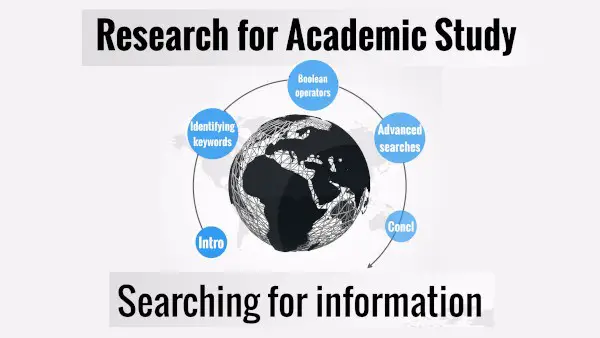
Published: 01 Nov, 2020
View on YouTube »»
View on Youku »»
Learn how to search for information using Boolean searches and other advanced techniques.
Academic Collocation List
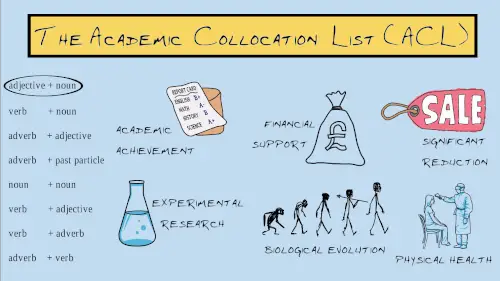
 Duration: 11.09
Duration: 11.09Published: 09 Jun, 2020
View on YouTube »»
View on Youku »»
Find out more about the Academic Collocation List (ACL), with examples. There is a worksheet (with answers and teacher's notes) for this video.
Coherence & Cohesion
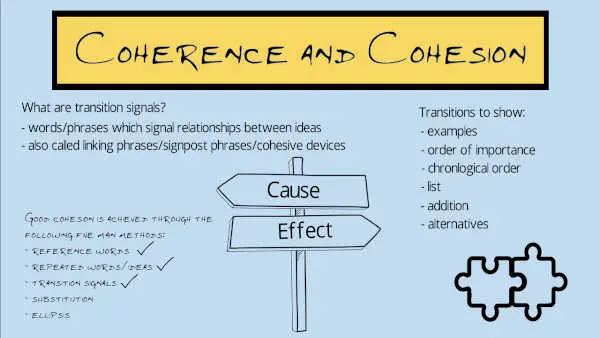
Published: 12 Feb, 2020
View on YouTube »»
View on Youku »»
Understand how to achieve good cohesion and coherence, and how to improve this area in the IELTS and TOEFL tests.
Academic style
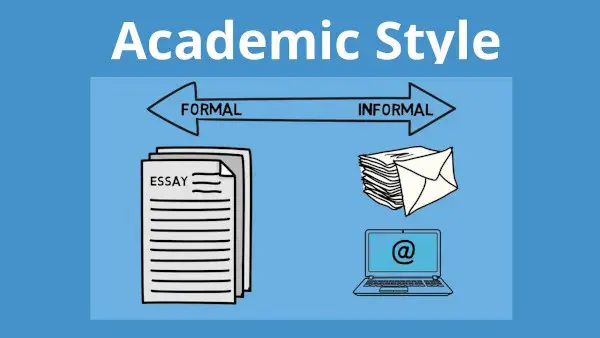
Published: 01 Jan, 2020
View on YouTube »»
View on Youku »»
Study 10 rules for academic writing style with this video.
Hedging
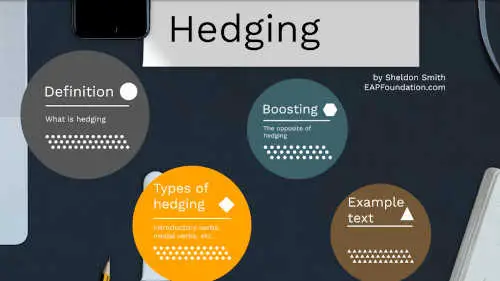
Published: 14 Dec, 2019
View on YouTube »»
View on Youku »»
This video defines hedging, gives different types, compares hedging with boosting, and gives examples in an authentic academic text.
Compare & Contrast
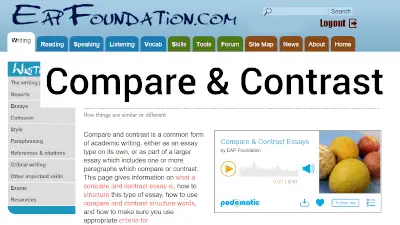
Published: 28 Oct, 2018
View on YouTube »»
View on Youku »»
This is a video for the compare and contrast essays page, covering structure, transition words, and comparison and contrast criteria.
Website overview
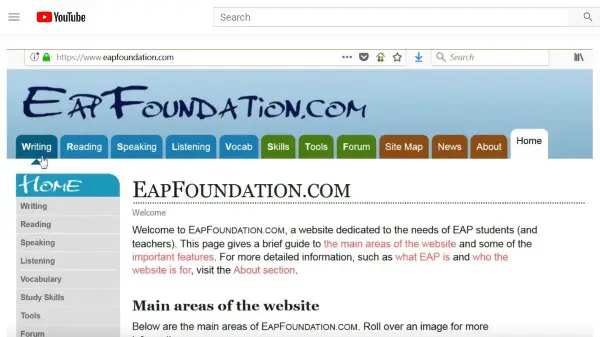
Published: 23 Sep, 2018
View on YouTube »»
View on Youku »»
An introduction to EAPFoundation.com for those unfamiliar with the site.
Note-taking styles
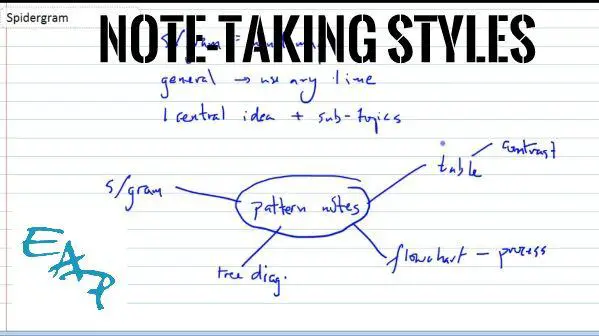
Published: 28 Oct, 2017
View on YouTube »»
View on Youku »»
See how to take notes in different styles: linear, table, flowchart, tree diagram and spidergram. Includes information on the Cornell Method.
AWL Highlighters
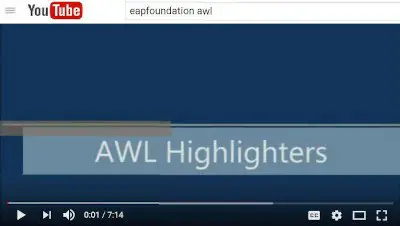
 Duration: 7.15
Duration: 7.15Published: 27 Jun, 2016
View on YouTube »»
View on Youku »»
Take a look at the three main AWL highlighters on the web. There is a worksheet (with answers and teacher's notes) for this video.
EAP Shorts
Each video in the EAP Shorts series covers an element of academic English very briefly (2-4 minutes), with a snappy tune and text to go with the video rather than voice-over. These are a great way to introduce or review a topic; useful for teachers as well as students. New videos will be released every few weeks.
7. What are Citations?
Duration: 2.50Published: 22 Mar, 2021
View on YouTube »»
View on Youku »»
Understand what citations and references are.
6. What is Plagiarism?
Duration: 3.36Published: 05 Jul, 2020
View on YouTube »»
View on Youku »»
Understand what plagiarism is and how to avoid it.
5. What is the Writing Process?
Duration: 3.12Published: 02 Mar, 2020
View on YouTube »»
View on Youku »»
Understand the 10 stages of the writing process.
4. What is a report?
Duration: 2.34Published: 15 Feb, 2020
View on YouTube »»
View on Youku »»
Understand report writing, including differences between reports and essays.
3. What are symbols?
Duration: 3.43Published: 03 Feb, 2020
View on YouTube »»
View on Youku »»
See why symbols and abbreviations are important, and how to abbreviate words.
2. What is the AWL?
Duration: 2.07Published: 20 Jan, 2020
View on YouTube »»
View on Youku »»
Get an overview of the AWL (Academic Word List) with this video.
1. What is EAP?
Duration: 4.13Published: 06 Jan, 2020
View on YouTube »»
View on Youku »»
Find out more about what EAP is and how it is different from General English.
0. About EAPFoundation
Duration: 2.42Published: 04 Jan, 2020
View on YouTube »»
View on Youku »»
This gives an overview of the website, and how you can support it via Patreon.
Enrich Your Vocabulary for IELTS & TOEFL
Enrich Your Vocabulary for IELTS & TOEFL is a series of videos that focus on different topics and target the kind of vocabulary needed to score higher on these tests. The vocabulary is carefully chosen using recognised word lists such as the Academic Word List (AWL), Academic Vocabulary List (AVL) and the Academic Collocation List (ACL), as well as targetting mid-frequency vocabulary.
3. Crime
Duration: 15.13Published: 09 Apr, 2022
View on YouTube »»
View on Youku »»
Study words and phrases for the crime, such as deterrent, enforce, engage in, and perpetrator.
2. Environment
Duration: 12.54Published: 13 Mar, 2022
View on YouTube »»
View on Youku »»
Study words and phrases for the environment, such as biodiversity, deforestation, environmental, and impact.
1. Physical Health
Duration: 10.41Published: 27 Feb, 2022
View on YouTube »»
View on Youku »»
Study words and phrases related to physical health, such as calorie, cardiovascular disease, diabetes, diet, and physical activity.

Author: Sheldon Smith ‖ Last modified: 17 February 2024.
Sheldon Smith is the founder and editor of EAPFoundation.com. He has been teaching English for Academic Purposes since 2004. Find out more about him in the about section and connect with him on Twitter, Facebook and LinkedIn.
1
2
3




